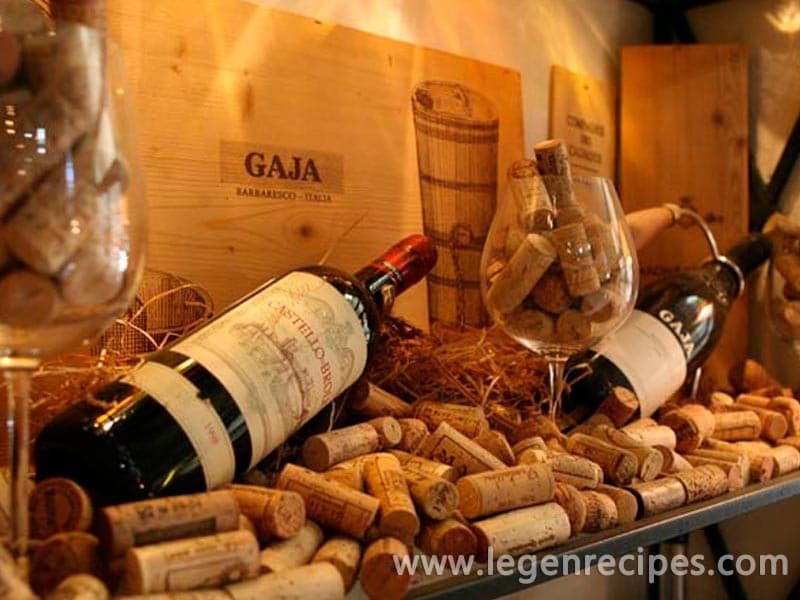Wine Stopper.
This wine stopper must be … cork. Under this statement, many are willing to subscribe to wine lovers, convinced that clog bottle of glass, plastic or an aluminum screw cap – it is disrespectful to the traditions. But is it? And what are the advantages and disadvantages of different plugs?
Natural cork is made from the bark of two species of oak – cork (Quercus Suber) or Western (Quercus Occidentalis). That bark, instead of wood. For the environmentally responsible reader will notice that after the removal of the bark of trees do not die in a few years for them grows more smooth bark, so the production of natural corks do not cause any harm to the environment.
What are the advantages of natural cork? It can be nice to open a “typical” sound – again. It is easy to dispose of (again, without causing harm to the environment) – two. But most importantly – natural cork passes inside the bottle microscopic fraction of oxygen, which give the wine to “breathe” to evolve, “to grow up” and mature, and, at the same time protects it from the intense “dialogue” with the air (otherwise it quickly deteriorated) . Therefore, natural cork – often the only option for “difficult” outstanding wines with great development potential.
And besides, natural cork – it’s a tradition. This is how Konstantin Guntrum says Luis, the owner of a wine farm Lois Guntrum (region of Rheinhessen, Germany), existing since 1648: “For our best wines we hesitate to use any other means of closing, except for natural corks, – he explained. – The fact that our customers prefer the classic traditional wine bottles. And if in the case of table wine which they drink for lunch every day, yet there may be some innovations at the holiday table, no surprises are not welcome. In addition, some of our customers while drinking a bottle or two in honor of a certain date, such as engagements, birth of a child or a wedding anniversary, a stopper to retain memory. A piece of aluminum in this case is inappropriate and can only spoil the party. ”
However, natural cork has its problems. If the bottle with natural cork is transported or stored in an upright position, the cork dries up, and the wine gradually deteriorates. So for wines that can stand more than a month on the shelf in the supermarket, so the cork, unfortunately, is not very suitable.
But the main problem – the so-called “tube defects”, because of which are tainted by an average of about 3% of the wine in the world. The fact that the cork bark contains trihloranizol – a substance that can impart musty odor characteristic fault. Keep in mind that the winemaker is required to replace a broken wine bottle to another and, in addition, to assume all costs of delivery. According to various estimates, the annual wine houses lost due to a defect cork about 10-15 billion dollars.
The owner of the renowned companies Domain Laroche (Chablis, France) Michel Laroche once admitted: “tube defects ruining the best wine of our economy. At the same time significant differences between wines, different types of plugs closed, I do not see. ”
What are the alternatives to classic jam?
Pressed cork is made from “scraps” left over from the whole natural corks: they are ground, mixed with paraffin, food-grade silicone and polyurethane adhesive and form a plug. What are their advantages? Cheapness and similarity to natural cork.
However, the cork does not allow guilt to develop. And with aging wine for over a year can spoil the taste. That is why the cork is usually sealed a cheap table wines without the potential exposure of more than two years in the bottle.
Synthetic corks made of soft thermoplastic material used by many wine producers of the New World, as well as some Italian and French producers of table wine.
The main advantage of synthetic cork – its cheapness. The main disadvantage of a much more serious: synthetic cork is often passed into the bottle air, because of what the wine can go bad.
Plastic plugs clog cheap sparkling wines, some manufacturers in Russia, Ukraine, Moldova, Bulgaria and Hungary. They are also very cheap, but they open the sealed bottle is often difficult.
Glass stoppers in recent years have become incredibly popular with producers in Austria, Germany and Italy.
The glass tube – the aesthetic and attractive in many ways, natural alternative to the cork. The inner surface is covered with a transparent plastic plug that seals the closure.
Significant negative glass stoppers – its high price. In addition, the wine in a bottle with glass stopper develops not as intense as in a bottle with a natural.
Aluminum screw stoppers, many winemakers consider the most promising: they are easy to open, they’re pretty cheap, yes and no “tube defects” are not afraid of the blame. Screw caps made of aluminum-based alloys and supply of plastic seal. They are used not only to producers of table wines, but many winemakers of the highest class, for example, some high-end houses in Spain.
However, the legislation of some countries does not allow producers of top wines to switch to a new type of capping. For example, the well-known Italian company Allegrini (Veneto Region) at the time the party was forced to withdraw Valpolicella Classico, closed with screw caps, as it contradicts the existing law about Italian wines DOC (names of controlled origin). Pour the wine into another bottle capping was impossible, so the producers had to re-stick labels, removing the word and leaving only Classico Valpolicella, ie the lower the status of the wine and thus its price.
So what cork is preferable?
Table wines may well be covered by any stoppers and cork screw even preferable if the wine is stored standing up, not lying on the shelf.
Many quality wines are best stored under glass stopper, especially if the bottles are transported in vetikalnom position.
As for the top-end wines with a long maturation potential – we can not do without a cork, through which the wine will “breathe” and develop.




